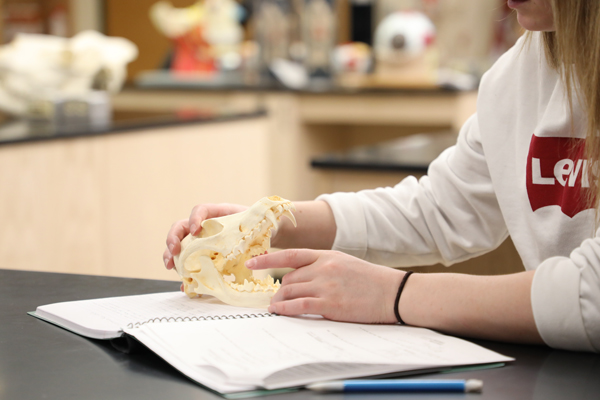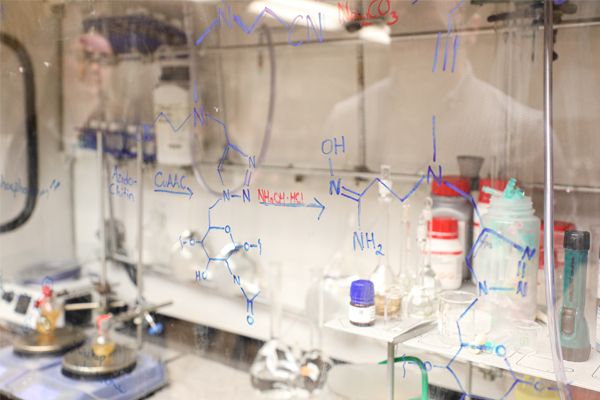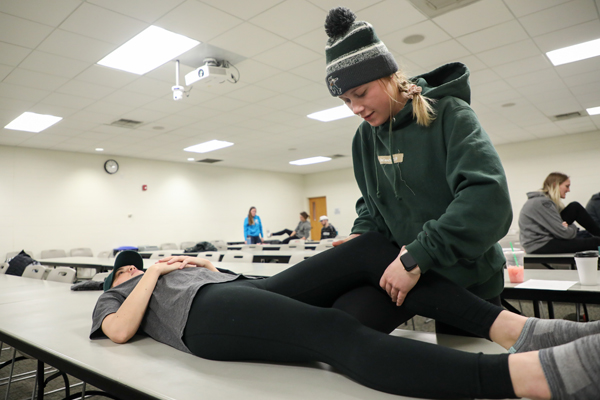
Pre-Physician Assistant
The pre-physician assistant focus area at Montana Tech is designed to give students the science pre-requisites necessary for acceptance into a physician assistant program. Students interested in pursuing a career as a physician assistant typically major in Cellular and Molecular Biology in Biology or the Biochemistry option in Chemistry. Most physician assistant programs are at the doctoral level and require a B.S. degree to be eligible for admission.
Certified physician assistants (PA-C) medically manage individuals in collaboration with a supervising physician. Montana Tech’s faculty helps you tailor a plan of study to meet pre-requisites for post-graduate study.
Why Study Pre-Professional Health at Montana Tech?
Montana Tech has a long and distinguished history of placing students in professional health programs at universities like Harvard, Creighton, the University of Washington, and Colorado State University. Our rigorous academics, modern facilities, one-on-one mentoring and affordability prepare students for success at a fraction of the cost of other universities.
Join our Student-Centered Program
Pre-physician assistant majors receive personalized attention from world-class Montana Tech faculty in a close-knit and supportive environment. You can work with faculty on special topics or independent study. You’ll also have opportunities to work side-by-side with them on groundbreaking research, from disease transmission and environmental health to the discovery and characterization of mycobacteriophages (viruses that infect mycobacterial hosts). Montana Tech also offers undergraduate research scholarships for students to pursue their own research interests.
Ideal Location
Take a break from meeting your pre-professional health requirements by enjoying beautiful Montana. Close to campus are opportunities for skiing at resorts and in the backcountry, hiking Continental Divide Trail and other trails, fishing in pristine mountain streams, or experiencing southwest Montana’s hot springs.
How to get into Physician Assistant Programs
- Make a thorough examination of yourself as to whether you really do want to get into physician assistant school and become a physician assistant. Do you know what becoming a physician assistant entails? Spend time doing this self-examination and make sure becoming a physician assistant really is what you want to do. Do not rush into physician assistant school just because you have not explored all possible options. Being a physician assistant is incredibly rewarding, but just make sure your temperament and personality fit this type of profession.
- Carefully read through what your schools of choice prefer and emphasize in terms of their admission policy. Some schools like people who have traveled and seen the world, other schools are more academically oriented, and still other schools prefer students who have taken certain courses not listed on their list of prerequisites. Thoroughly read college websites thoroughly, perform site searches for “physician assistant” and visit as many related links as possible. A university’s online physician assistant newsletter can also be a good source of information.
- Once you’ve decided to go to physician assistant school and have researched the appropriate information from the schools on your list, begin to think about how you can increase your chances of getting into physician assistant school. Purchase and read several good books on the topic, but also form innovative ideas of your own.
- Prepare as early as possible; there is no such thing as preparing too early. If you suddenly decide to apply to physician assistant school one year before applications are due, you will still have time to work up a good application (assuming you have all your pre-requisite courses. The more time between your decision and the application deadline, the better your chances of getting accepted. This allows you to think about which courses or activities you should engage in to make you a more competitive applicant or a better physician assistant in the future.
- Take any standardized tests required at the appropriate time. Do not take these tests too early, as you will be wasting time learning the material by yourself instead of learning it during your lectures. Also, do not decide to take it early just because you are afraid you may not do well the first time and may need to repeat it to get a higher score. Similarly, do not take these standardized tests too late or you will forget much of what you learned during previous years. The most important thing is to be able to make the deadline. Take tests before the deadline, but try to take them only when you are ready.
- Keep your grades high. In the midst of dealing with your extracurricular activities, do not forget to keep your grades as high as possible. Getting high grades shows determination, intelligence, and willingness to work hard. Once you have taken a course, your transcript is basically set in stone. Getting good grades shows you learned what was taught. What you learn may not directly relate to your future, but it will always indirectly help you.
Into medical, dental, pharmacy, or other professional schools
You’ll earn college credit and gain hands-on experience.
Many pre-professional health majors are active in the Biology Club, Chemistry Club, and Pre-Professional Health Club.

Students at Montana Technological University have a new early acceptance pathway to medical school through a recently signed agreement.

There is increased popularity in Montana Tech’s pre-professional health, pre-med, and pre-vet programs.

Two Montana Tech biology seniors are headed to highly competitive dentistry programs after graduation. They say the one-on-one opportunities offered at Montana Tech helped them stand out in the admissions process.
Is the Pre-Physician Assistant Program a Major?
The Montana Tech pre-physician assistant program is not a major but rather a focused set of courses that enable you to complete program requirements to enter the physician assistant program of your choice.
What Kinds of Jobs do Physician Assistants Get?
- Assess patients by performing a comprehensive history and physical examination;
- Perform or order diagnostic tests, interpret results and develop a diagnosis (diagnostic tests may include laboratory and radiographic studies, including x-ray, ultrasound, CT, MRI, Bone Density (DXA) or other test when indicated);
- Formulate a treatment plan to manage the patient’s acute or chronic conditions with the goal of optimizing treatment;
- Perform interventions such as aspiration and injection of joints;
- Order physical or occupational therapy depending upon the patient’s needs;
- Prescribe, order and implement interventions and treatments in accordance with state law;
- Prescribe medications in all 50 states, the District of Columbia, the Commonwealth of Northern Mariana Islands and Guam;
- Collaborate with other health care providers to assess patient’s needs and use community resources to plan appropriate care;
- Provide therapeutic intervention commensurate with their level of education, specialization, and experience and in accordance with state law;
- May be involved in medical research;
- Serve as a health information resource for patients and families;
- Serve as an advocate for the patient and family within the health care facility, community and the legislative arena.
In conclusion, if becoming a physician assistant is really what you want, go for it! Do not be afraid of the competition. Research, plan and prepare. There will always be a spot for the determined.
Through 2030, much higher than most career fields
Average GPA of students accepted to PA schools in the U.S. in 2020
The Exercise and Health Science degree at Montana Tech gave me the freedom to direct my studies to my future career endeavors as they became clear. I contemplated several career options such as dentistry, physical therapy, medical doctor, and eventually decided on being a physician assistant. The EHS degree allowed me to not only complete my degree, but allow me the freedom to ensure I fulfilled my pre-requisites for any future post-baccalaureate degree programs. The professors in the Exercise and Health Science program not only had an invested interest that I succeed, but had a personal interest in my success which to this day I find invaluable. I have been a physician assistant since 2006 working in neurosurgery. I am involved in clinical care of patients, neurosurgery trauma, and minimally invasive spine surgery. I attribute much of my professional success to my days at Montana Tech in the EHS program.
KLINTON (JOSH) PFEIFLE, B.S. Exercise and Health Science '04 Physician Assistant – Neurosurgery
Explore Pre-Physician Assistant Courses
The Montana Tech pre-professional health program helps you explore the health care industry and complete graduate program requirements through a range of pre-professional health courses, such as anatomy and physiology, biochemistry, the freshman pre-professional health seminar, current topics in health care courses, and internships.
Meet faculty, explore our research expertise, and more.
Explore other programs in the College of Letters, Sciences, and Professional Studies.
Get semester-by-semester degree plans for your physician assistant goals.

Gain knowledge in biology including evolution, ecology, genetics, and cellular & molecular biology.

Career paths from the biochemistry option include human and veterinary medicine, dentistry, pharmacy, optometry & more.

The Exercise and Health Science curriculum emphasizes health, wellness, exercise physiology, and occupational health and safety.
We can answer your questions and help you get started.
Department Head and Professor
akuenzi@mtech.edu
406-496-4793